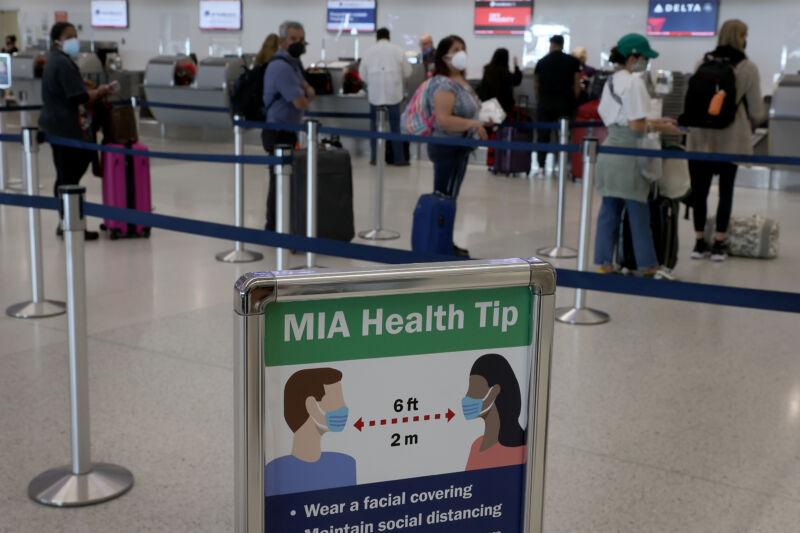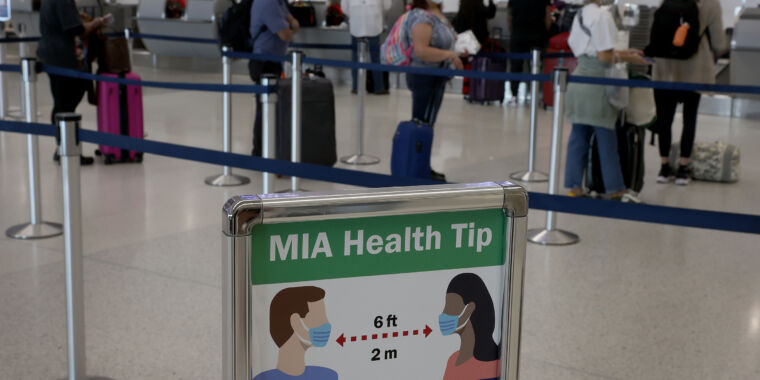
A federal judge in Florida on Monday overturned the Biden administration’s mask mandate for public transportation and travel hubs.
The abrupt ruling shakes up passenger requirements as Americans resume pre-pandemic travel levels and as cases of the omicron subvariant BA.2 begin to tick up.
It is unclear if and when the Justice Department will appeal the judge’s order and request a reprieve to reinstate the mandate until further litigation. According to the latest reports, government officials have confirmed that the mandate is no longer in effect, although the Centers for Disease Control and Prevention still recommends the use of masks on public transportation. The board would consider the next steps.
Monday’s ruling came from Federal District Judge Kathryn Kimball Mizelle, who overturned the mandate over a lawsuit filed in July 2021 by the conservative Health Freedom Defense Fund group and two Florida residents. The residents claimed that the federal mask mandate increased their anxiety and panic attacks.
Mizelle ruled that the CDC — which extended the mandate until May 3 — violated the powers conferred by Congress in enacting the law, and the agency also violated administrative procedures in its implementation. As such, she declared the mandate illegal and vacated it.
Mizelle’s argument for the ruling will no doubt spark legal debate, as similar cases have often failed to knock down the federal mandate, including cases that reached the Supreme Court level. And Mizelle also has a controversial history. She was named to her position in 2020 by former President Donald Trump, despite the American Bar Association deeming her “unqualified” to serve as a district court judge. According to the ABA, federal bank nominees must have at least 12 years of law enforcement experience before holding the position. But at the time of her appointment, Mizelle had only been a lawyer for eight years and had not tried any cases as a lead or co-counsel. Still, she was confirmed along party lines as a district court.
Cleaning argument
In her 59-page statement that single-handedly vacated the federal mandate, Mizelle’s argument relied in part on a 1940s definition of the word “plumbing.”
In issuing the mask mandate, the CDC made use of the Public Health Services Act (PHSA) of 1944. Mizelle zoomed in on a particular sentence which reads: “The implementation and enforcement of such regulations must require the [CDC] may provide such inspection, fumigation, disinfection, sanitationeradication of pests, destruction of animals or objects so contaminated or contaminated as to constitute a source of dangerous contamination to humans, and other measuresas in [the Secretary of Health and Human Services’] judgment may be necessary.” [emphasis added]
The CDC has clearly interpreted “hygiene” and “other measures” as masks because masks promote “hygiene” as it is currently defined: “the promotion of hygiene and prevention of disease by maintaining hygienic conditions.” However, Mizelle sought a definition of “sanitary” from about 1944, when the PHSA was drafted. She referred to the 1946 issue of Funk & Wagnall’s New Default Dictionary, who defined sanitation as “the removal or neutralization of elements that are harmful to health.” She dubiously argued that the PHSA’s use of “hygiene” was intended to “active cleaning.”
The context of the PHSA, she wrote, “indicates that ‘sanitation’ and ‘other measures’ refer to measures that clean something, not measures that keep something clean. Wearing a mask does not clean anything,” she argued. “At the most it catches virus droplets, but it doesn’t ‘clean’ the person wearing the mask and it doesn’t ‘clean’ the means of transport.
Despite the obvious counter-argument that a mask cleans the exhaled air by trapping and removing virus droplets that are harmful to health, she concludes that the mask mandate is “outside” the scope of the PHSA.
articulated reasons
In the second part of her speech, Mizelle focused — at length — on the CDC skipping a 30-day public comment period before enacting the travel mask mandate. Under the Administrative Litigation Act, the CDC may skip that 30-day period if it believes it has “good reasons,” which applies in “emergencies” where delaying “could cause serious harm.”
To its “charity,” the CDC called a global pandemic that triggered a public health emergency that has killed nearly a million Americans so far.
While Mizelle seemed to agree with the CDC that the public health emergency is a good enough reason to skip the period, she insisted that the agency was too succinct in its written justification. Mizelle noted that when the Centers for Medicare and Medicaid Services (CMS) skipped the comment period before mandating COVID-19 vaccines for staff at CMS-funded facilities, the agency wrote a four-page explanation of the “charity” — complete with 40 footnotes, Mizelle emphasized.
The CDC, on the other hand, justified its abbreviated timeline with a single sentence, calling it “common sense” that the pandemic was a good thing. But Mizelle apparently wanted receipts, even though she didn’t necessarily think the agency was wrong.
“The court accepts the CDC’s policy that mandating masks will limit the transmission of COVID-19 and thus reduce the serious illnesses and deaths caused by COVID-19,” she wrote. “But the finding alone isn’t enough to establish a good case.” Elsewhere, she complained that “the CDC failed to articulate that reasoning” and “indicated specific reasons.”
“Basically, regardless of whether the CDC made a good or accurate decision, it had to explain why it did the way it did,” she wrote.
Overall, Mizelle concluded that “it is indisputable that the public has a strong interest in combating the spread of COVID-19… adequately explain its decisions.” As such, she called the mask mandate illegitimate and gave it the ax.

